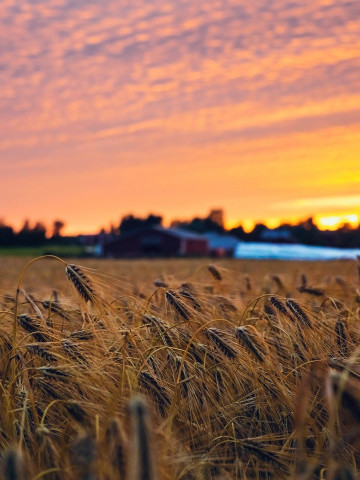
Bioekonomi
I bloggen Bioekonomi får du veta mer om Yrkeshögskolan Novias forsknings-, utvecklings- och innovationsverksamhet inom forskningsområdet systemomställning för att bygga resiliens. Majoriteten av personalen finns huvudsakligen i Raseborg. Här bildar forskare, projektarbetare, lärare, studerande och administrativ personal en dynamisk helhet. På vår blogg kan du läsa om vilka vi är, vad vi gör och om våra resultat. Välkommen!
Vid frågor eller feedback kontakta bloggens administratör Heidi Barman-Geust (Heidi.barman-geust(a)novia.fi)
Vi följer CC BY 4.0 om inget annat nämns.
Systemic Transformation to Build Resilience is one of Novia University of Applied Sciences six' research areas. The activity is mostly located in Raseborg, in southern Finland. As a dynamic unity, our researchers, project workers, teachers, students and administrative personnel produce versatile results in research, development and innovation. We blog about who we are, what we do, what our conclusions are, and how we implement them. Welcome!
If you have questions, please contact Heidi Barman (Heidi.barman-geust(a)novia.fi)
We folllow CC BY 4.0 if nothing else is stated.
Strengthening Nordic Wool: Insights from the F.E.L.T. WOOL Visit to Sweden
Swedish Fine Wool – local breeds fuel development of local wool industry
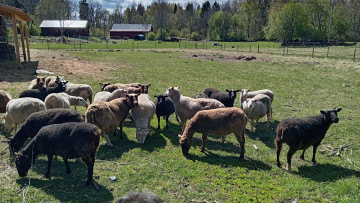
The 5th and final F.E.L.T. WOOL project visit took place in Sweden, where our participants from Norway, Lithuania, Finland and Estonia visited local spinneries and related companies both old and new.
The visit began at Färsna Gård, a heritage farm and nature park. There the group met Roslags sheep, a rare Swedish breed known for its long, shiny, and strong wool.
During the visit days, workshops were organized with local renowned felt artists as well as talks with sheep farmers and industry activists of sort – all enthusiastic and committed to develop the industry to provide high quality and locally characteristic wool and products in the future. Workshop led by felt artists focused on repurposing coarse wool into art and functional products emphasizing felting’s creative potential, relative rarity as a craft and time efficiency compared to weaving or knitting. Interest in Sweden for felting has grown through education at the Academy of crafts Stockholm and new digital courses.
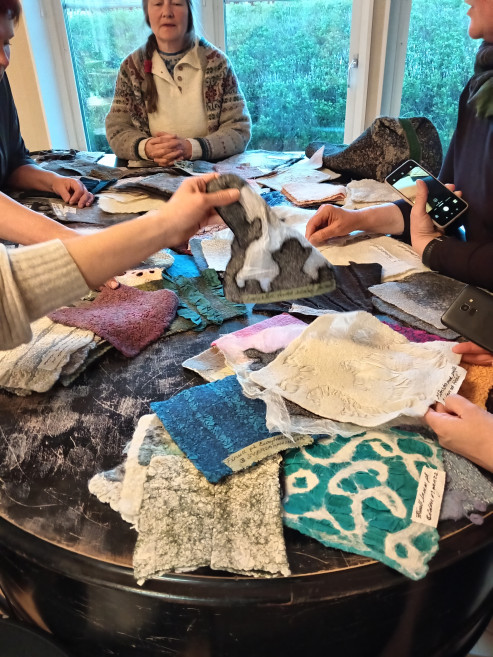
Participants gather around to explore nano-felted sample pieces. Picture: Chanika Jayawardana
Among visits to farms as well as through lectures on development, local heritage breeds were visibly represented. Gotland sheep and Swedish Finewool (as well as Rya, Jämtland, Dala Pälsfår) were highlighted for their specific wool characteristics and potential in different uses. Through Arena Svensk Ull – a local organization, solutions like farmer training programs, a national wool classification system (partially borrowed from Norway) and data driven standards have been developed to boost the industry.
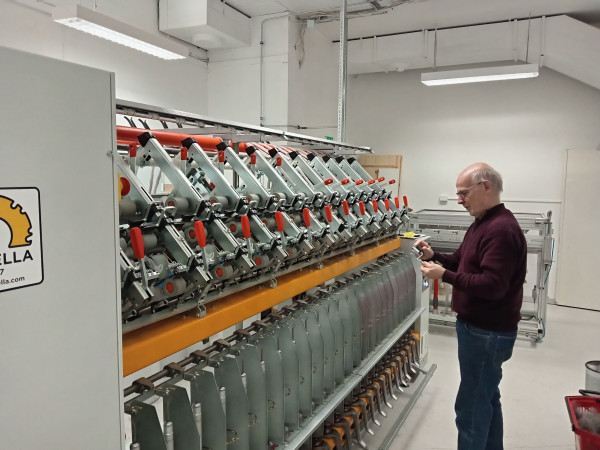
Rodens Ullbruk spinner demonstrating how the modern spinning machine works and cleaning during the production process. Picture: Chanika Jayawardana
Sweden’s wool industry revival blends heritage preservation with modern solutions. Heritage breeds are kept along to promote genetic diversity, advocating for wool specific applications. Supporting to farmers with wool collection stations to reduce cost for infrastructure is seen as a key point of development of the industry as a whole. Although the trip to Sweden was last of the project, it’s seen as a beginning of wider Nordic and cross Baltic cooperation and growing ground for future projects. The whole region as well as local, smaller local activities will benefit from continued collaboration and sharing of knowledge and best practices.
F.E.L.T. WOOL - Future emergence of local textiles based on wool is financed by NordPlus Horizontal. The trip to Sweden was organized in collaboration with the projects NorNa - Nordic Natural Fibres in Circular Economy, which is funded by The Swedish Cultural Foundation in Finland and NyNässla, which is funded by the European Agricultural Fund for Rural Development (EAFRD) through Uusimaa's Centre for Economic Development, Transport, and the Environment (ELY-Keskus), Svenska kulturfonden and Stiftelsen Finlandssvenska Jordfonden.
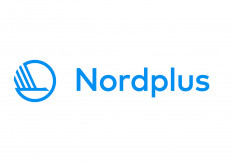

The blogpost has been reviewed by Novia's editorial board and accepted for publication on 11.6.2025.![]()
Bioekonomi
Blogginlägg som är granskat av Novias redaktionsråd är utmärkta med nyckelordet "Granskat inlägg".
Vi följer CC-BY 4.0 om inget annat nämns.
Ansvarsfriskrivning: Författaren/författarna ansvarar för för fakta, möjlig utebliven information och innehållets korrekthet i bloggen. Texterna har genomgått en granskning, men de åsikter som uttrycks är författarens egna och återspeglar inte nödvändigtvis Yrkeshögskolan Novias ståndpunkter.
Disclaimer: The author(s) are responsible for the facts, any possible omissions, and the accuracy of the content in the blog.The texts have undergone a review, however, the opinions expressed are those of the author and do not necessarily reflect the views of Novia University of Applied Sciences.